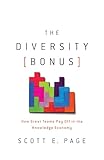The diversity bonus : how great teams pay off in the knowledge economy / Scott E. Page.
Series: Our compelling interests (Series): Publisher: Princeton ; Oxford : Princeton University Press 2017Description: xvii, 302 pages : illustrations.Content type: text Media type: unmediated Carrier type: volumeISBN: 9780691176888.Subject(s): Diversity in the workplace| Item type | Current library | Class number | Status | Date due | Barcode | |
|---|---|---|---|---|---|---|
| Book | Millbank Dewey | 658.3008 PAG (Browse shelf(Opens below)) | Available | 015246 |
Introduction / Earl Lewis and Nancy Cantor -- The contrary assumption -- Diversity bonuses: the idea -- Cognitive repertoires -- Diversity bonuses: the logic -- Identity diversity -- The empirical evidence -- Diversity bonuses and the business case -- Practice: D&T + D&I -- What Is the real value of diversity in organizations? Questioning our assumptions / Katherine W. Phillips -- The diversity prediction theorem.
"What if workforce diversity is more than simply the right thing to do in order to make society more integrated and just? What if diversity can also improve the bottom line of businesses and other organizations facing complex challenges in the knowledge economy? It can. And The Diversity Bonus shows how and why. Scott Page, a leading thinker, writer, and speaker whose ideas and advice are sought after by corporations, nonprofits, universities, and governments around the world, makes a clear and compellingly pragmatic case for diversity and inclusion. He presents overwhelming evidence that teams that include different kinds of thinkers outperform homogenous groups on complex tasks, producing what he calls "diversity bonuses." These bonuses include improved problem solving, increased innovation, and more accurate predictions--all of which lead to better performance and results. Page shows that various types of cognitive diversity--differences in how people perceive, encode, analyze, and organize the same information and experiences--are linked to better outcomes. He then describes how these cognitive differences are influenced by other kinds of diversity, including racial and gender differences--in other words, identity diversity. Identity diversity, therefore, can also produce bonuses. Drawing on research in economics, psychology, computer science, and many other fields, The Diversity Bonus also tells the stories of people and organizations that have tapped the power of diversity to solve complex problems. And the book includes a challenging response from Katherine Phillips of the Columbia Business School." Publisher's description.
